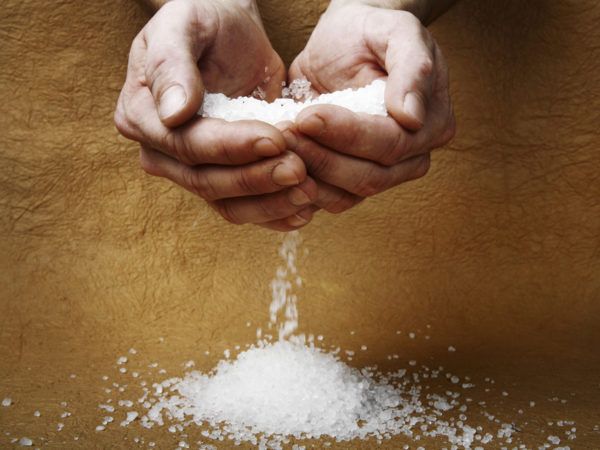Big Salt Shakeout?
I’m very confused by what I’ve heard lately about salt. Is it really OK to consume more than has been recommended in the past, or are we better off cutting back? Can you explain the contradictions?
Andrew Weil, M.D. | July 18, 2017

You likely read about findings from an investigation at Boston University School of Medicine in which more than 2,600 adults were followed for 16 years to track the effect of a low sodium diet on blood pressure. None of the participants, who were between the ages of 30 and 64, had high blood pressure when they entered the study. However, after the 16 years, those whose daily sodium intake was less than 2,500 mg had higher blood pressure than those whose sodium consumption was higher.
These findings aren’t the first to call into question current recommendations to limit sodium intake to prevent high blood pressure. In November 2014 I wrote about the results of three other studies published at the time that addressed this issue. One found that consuming less than 3,000 mg (3 grams) of sodium daily was associated with higher risks of cardiovascular disease and death; it also showed increased risks in those consuming more than 6,000 mg (6 grams) daily. That study enrolled more than 100,000 people from 17 countries and followed them for more than three years. It showed that low sodium consumption was associated with a 27 percent higher risk of heart attack, stroke and death than seen in participants whose intake was higher. The risks increased again when daily intake topped 6,000 mg.
Two of the three studies concluded that the only individuals who need to cut down on salt are those with high blood pressure and people over 55. However, the third estimated that sodium consumption exceeding 2,000 mg daily contributed to 1.65 million deaths from cardiovascular disease in 2010. We know that sodium consumption is associated with high blood pressure in some – but not all – people and that high blood pressure unquestionably raises the risk for cardiovascular disease.
The newly reported research showed that study participants with higher intakes of potassium, calcium and magnesium had lower blood pressure over the long term. Those whose sodium intake averaged 3,717 mg daily and whose potassium intake averaged 3,211 mg daily had the lowest blood pressure. These latest results have not yet been published in a peer-reviewed scientific journal. They were presented at the American Society for Nutrition Scientific Sessions during the Experimental Biology 2017 meeting April 22-26 in Chicago.
For the record, the World Health Organization, the American Heart Association and other health agencies recommend limiting sodium consumption to between 1,500 and 2,300 mg or less per day. Our minimum need is 1,500 mg. The average daily consumption in the United States is about 3,400 mg. I wouldn’t suggest consuming more sodium on the strength of findings linking higher levels with lower health risks. I do recommend increasing intake of potassium by eating more fruits and vegetables.
Andrew Weil, M.D.
Sources:
Lynn L. Moore, “Low Sodium Intakes are Not Associated with Lower Blood Pressure Levels among Framingham Offspring Study.” Presentation, Experimental Biology 2017 meeting April 25, Chicago, IL.
Andrew Mente et al, “Association of Urinary Sodium and Potassium Excretion with Blood Pressure.” New England Journal of Medicine, 2014; 371:601-611
Martin O’Donnell et al, “Urinary Sodium and Potassium Excretion, Mortality, and Cardiovascular Events.” New England Journal of Medicine, 2014; 371:612-623
Dariush Mozaffarian et al, “Global Sodium Consumption and Death from Cardiovascular Causes.” New England Journal of Medicine, 2014; 371:624-634












